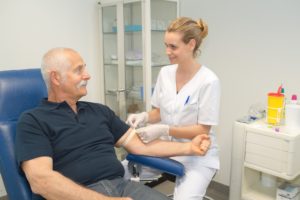What Is Phlebotomy?
Phlebotomy 101: What Is It and Why Is It Important?
People have known that blood held the answers to many medical problems for thousands of years. While “medical” practices have advanced from simple bloodletting to genuine blood testing, at the core, doctors always had the right idea.
Nowadays, we use blood tests for a wide variety of things, from testing for pregnancy to testing for cancer. Phlebotomy has come a long way.
But what exactly is phlebotomy? Why does it matter so much, and how can you get into the field? Let’s talk about it!
Read on to learn all about the role of phlebotomy in medicine and how you could become a phlebotomy technician yourself.
What Is Phlebotomy?
So what is phlebotomy anyway? What does a phlebotomist do?
In short, phlebotomists are medical professionals who draw blood. They can work in hospitals, doctors’ offices, labs, and plenty of other places where people will need blood draws.
Phlebotomy is the actual procedure of drawing blood. It’s usually done using a small needle to puncture a vein, often in the arm, to draw a small amount of blood.
The phlebotomist will then take steps to send the blood where it needs to go for testing. In some cases, the blood will have to go offsite to a special lab. In others, there may be an in-house lab for quicker responses.
Why Is Phlebotomy Important?
So what’s the value of phlebotomy? Why are there specific medical professionals for this task, and why are blood draws so important at all?
The blood taken from blood draws by phlebotomists can provide important information about a person’s health. It can help doctors check for diseases, monitor certain ongoing conditions, or conduct other medical tests.
Phlebotomy plays a crucial role in diagnosing and monitoring various medical conditions and is an essential part of healthcare.
So what types of things can blood tests check for?
A short list includes (but is not limited to):
- Diabetes
- Thyroid issues
- Infections
- Anemia
- Blood clotting disorders
- Cancer
- Allergies
- Hormone imbalances
- Vitamin and mineral levels
This is not an extensive list. Blood tests are powerful tools for doctors, and they can save the lives of patients.
How Does One Become a Phlebotomist?
Are you considering becoming a phlebotomist? Whether you see it as a life-long career or as an entryway into the healthcare field, it’s easier than you think to get your foot in the door.
You can take a brief course to get a certificate that allows you to work as a phlebotomy technician. This is fantastic for anyone looking for a career change or who already works in the medical field and wants to expand their skill set and offerings.
Are You Ready to Become a Phlebotomy Technician?
So what do you think? Is a role as a phlebotomy technician right for you?
Phlebotomy is important, and the world will always need helpful and competent phlebotomists. You have the potential to help patients and doctors.
We want to help you reach that potential. Learn more about our phlebotomy technician program and reach out today to get started.



